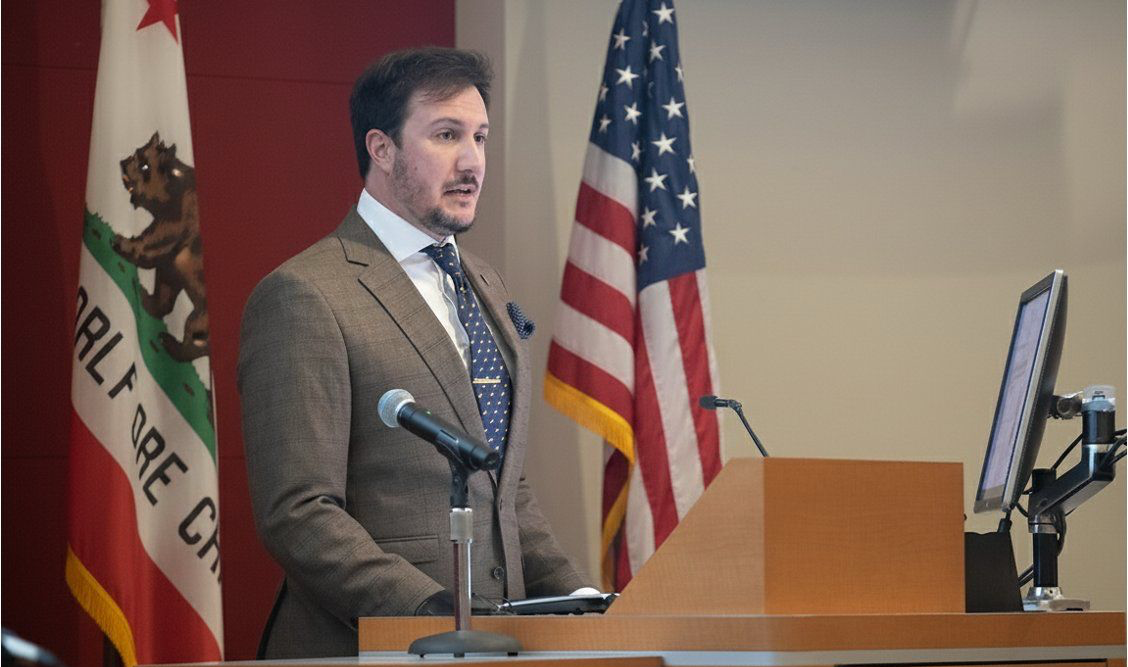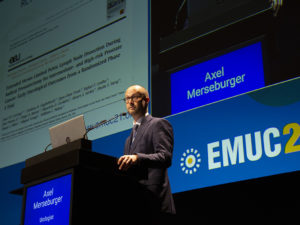At the upcoming EMUC25 Congress (13-16 November 2025, Prague), Prof. Giovanni Cacciamani (US) will present on AI-powered digital pathology, workflow automation, and advanced imaging platforms for diagnostics and patient care.
In this interview with Prof. Cacciamani, he addresses the most impactful AI innovations on the horizon, dispels common misconceptions about AI’s role in clinical practice, and shares tips on how young urologists can integrate AI technologies to strengthen both research and patient outcomes.
What is the single most significant AI advancement expected to have the greatest impact on clinical and patient workflows for urologists?
Prof. Cacciamani: “AI-powered digital pathology – particularly the combination of whole-slide imaging and deep learning. These systems can automatically detect, grade and highlight suspicious tumour regions with accuracy on par with expert pathologists, while also reducing the need for additional staining procedures like immunohistochemistry.”
What’s the biggest myth about AI in urology that you’d like to set straight?
“The biggest myth is the belief that AI will replace urologists outright. In reality, AI functions best as an augmentation tool, offering speed, precision, and data-driven insights that complement rather than substitute human expertise. I like to put it this way: AI will not replace urologists, but those of us who use AI will replace those who don’t. While AI can handle repetitive image analysis or flag patterns in vast datasets, only trained urologists can integrate this information with clinical context, patient preferences, and ethical considerations to make final treatment decisions. Far from removing the human element, AI actually allows us to focus more on complex decision-making and the human side of medicine.”
How can AI give young urologists a career edge in both research and patient care?
“As a surgeon scientist and the director of the first AI centre for urology in USA, I feel strongly that we must be prepared to use AI as the ultimate white-collar assistant – one that helps us deliver care with greater prevision, efficiency, and insight. For young urologists, this means learning how to integrate AI into clinical practice to enhance diagnostic accuracy with advanced imaging and cancer-mapping platforms, automate administrative burdens that often consume valuable time, and unlock research opportunities through rapid, large scale data analysis. In a field where deep AI expertise is still rare, mastering these tools not only sharpens clinical skills but also positions early-career urologists at the forefront of innovation in both patient care and academic research.”
If you were starting your urology career today, how would you prepare for the AI era?
“By building a strong foundation in AI principles and applications, seeking out opportunities to work directly with AI-assisted diagnostics and workflow tools, and collaborating with data scientists to understand the possibilities and limitations of these systems. While my generation and the one before mine are transitioning into the healthcare system that will be increasingly assisted by AI, the new generations will start from scratch with this technology already in place. This means they will be equipped right from the beginning with powerful tools that can enhance diagnostics, streamline workflows, and ultimately empower them to deliver better patient care from day one. Staying actively involved in AI research projects, engaging in professional forums on medical technology, and advocating for thoughtful integration of AI into clinical practice would ensure I remain not just up to date but ahead of the curve as the technology evolves.”
What’s one thing you hope every young urologist takes away from your EMUC25 presentations?
“AI literacy is no longer a “nice-to-have” but a vital professional skill. Mastering AI early will empower them to deliver faster, more accurate diagnoses, participate in innovative research, and shape the ethical and practical standards of AI use in urology. Those who embrace this technology now will be the leaders defining how it transforms patient care in the years ahead, while those who hesitate risk being left behind in a rapidly changing medical landscape.”
—–
The 17th European Multidisciplinary Congress on Urological Cancers (EMUC25) is set to take place in Prague, Czech Republic, from 13-16 November 2025. Each year the congress brings together leading experts across various genitourinary cancer disciplines to share their insights on best practices, key clinical trial developments, and the latest scientific advancements. You can view the full EMUC25 scientific programme and take advantage of registration savings if you sign up before 30 October 2025 (23:59 CET).



